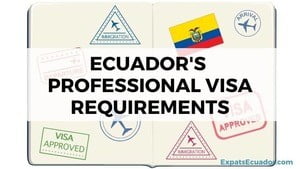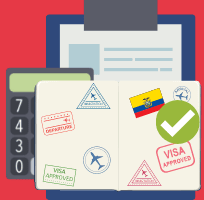We're getting to your messages. Thanks for your patience🙏
Ecuador is one of the most attractive options in all of South America for investors looking to relocate temporarily or permanently. Not only is it a dollarized country but it is also a country with wonderful landscapes, a unique and diverse gastronomy, and friendly people.
It also has one of the lowest investment amounts to unlock residency visa options with a low cost of living.
Let's explore why the investor visa is one of the most popular visa types for Ecuador.

The Temporary Residency Investor Visa is a popular option for foreigners looking to migrate to Ecuador. This visa type requires providing funds to Ecuador's economy. Be it through buying a property, a Certificate of Deposit in a bank, or starting a business, you'll need to invest a minimum of $46,000.
You can also obtain a Permanent Residency Visa after fulfilling two years as a temporary visa holder.
For those seeking not just a serene place to live, but also a haven for their savings, Ecuador stands out with its attractively low cost of living. Imagine having the opportunity to reside where the economic pressures are as gentle as the Pacific breezes - this is the reality Ecuador offers.
A comparison with the United States paints a clear picture: a cozy one-bedroom apartment nestled in the vibrancy of an Ecuadorian city center may cost up to 74% less. Groceries, transportation, and leisure - essentials for a fulfilling life - are notably lower in price, presenting a welcome contrast to many expats and investors.
This significant financial relief is a key motivation for many contemplating a life amid Ecuador’s charms, whether retirees stretching their pensions or savvy investors maximizing gains.
This visa allows you to stay in the country for 2 years and can be renewed. Those looking to advance to permanent residency are limited to spending less than 90 days outside Ecuador during their temporary residency.
For those not currently seeking permanent status or citizenship, continuous presence in Ecuador is not mandated, giving you more time to explore other countries.
Here is a breakdown of the possible expenses involved in your application:
Any of these prices may vary, for now, the price of visas and applications is stable, but you should always be aware of changes. A professional facilitator will be able to help and guide you throughout the process, they may have valuable contacts and your application will have a higher chance of being approved.
The process of obtaining a residency visa is detailed and requires applicants to meet general requirements meticulously.
1. Valid Passport
At least 6+ months, my personal recommendation is that it be at least two years because this way you will save yourself a problem or expenses if you decide to renew your visa or apply for permanent residence.
2. Police Record
When embarking on the exciting journey towards obtaining an Investment legal Visa status in Ecuador, it's essential to be thorough with official documents, and that includes conducting mandatory background checks. These checks are a cornerstone of the application process, ensuring that prospective residents meet the safety and security standards set by Ecuador. If you are from the United States you will need an FBI and Police Record Report. Add the Police Report from all those countries where you have stayed longer than 90 days in the last 5 years.
3. Investment
The financial criterion goes beyond mere income statements. Investment in a Certificate of Deposit (CD) or real estate must meet or surpass $46,000. Such firm but fair minimum investment requirements affirm Ecuador's embrace of expatriates who are willing to trust and contribute to its burgeoning economy. Also, a minimum investment of $47.500 is required if you not using CD's way. You will need to provide: Official documents such as bank statements confirming the monthly income. Property deeds or bank certificates underscoring the investment in a CD or real estate. These documents are more than mere paperwork; they are a testament to the symbiotic relationship Ecuador fosters with its international investors.
4. Monthly Income
Prospective investors are expected to showcase not only their monetary potency but a genuine commitment to contributing to Ecuador's growth. Proof of income is pivotal when applying for your Visa. Aspirants must present evidence that they can sustain themselves with a monthly income of at least $460. This figure is gracefully aligned with the Ecuadorian minimum wage, ensuring that foreign nationals live comfortably while respecting the local economy's standards.
5. Birth/Marriage Certificate
In case you or a member of your family needs to apply for a dependant visa you have to show your family bond.
6. Optional
Immigration Certificate from Ecuador. It depends on which office you're applying to or if an officer asks you for extra things.
Note: Documents not originally in Spanish must be translated and notarized. This is a vital step in ensuring that all your paperwork is in order.
This is a tricky one. Some migration offices will request that you have it and others may not. Either way, we do generally recomend having either private health insurance or public (IESS) to ensure your health is covered whilst in Ecuador. You can get a a health insurance quote here.
If you also want to include a family member on your application, they can only be up to the second degree of consanguinity. Let's explain this:
In order for a dependent's application to be accepted, the visa holder must demonstrate an additional income of $250 for each applicant and demonstrate their legal ties as part of the requirements.
Example:
John has a temporary residence visa (any type) and wants his wife Kathy to apply for his visa as a dependent.
John's requirements must include an extra $250 per month to what is already required according to the type of visa he has. Kathy must present John's bank statements and must also present her Apostilled and translated marriage certificate to verify the relationship.
If John also wants to add his son Sam as a dependent, then John must show an additional $500 in his monthly income (covering Kathy and Sam's expenses) and Sam's birth certificate.
Determine your application method. There are currently two ways to apply for visas in Ecuador. The online option and the in-person option. The online option is new and as of writing we aren't sure how efficient the process will be. The Ecuadorian government doesn't have a strong track record of implementing digital projects like this, but we hope the process is user friendly and works.
The other option is to the physically apply at any office of the Ministry of Foreign Affairs and Human Mobility in Ecuador.
We suggest evaluating which is best in your circumstances.
Once you have all the documents in order, you must attach them to the application documents or if a digital application is more suitable for you, then you will need to upload all the documents in PDF format. In either case, you must pay the amount relevant to the application. Check the costs here.
You must not forget that all documents must be translated and apostilled or legalized as the case may be. If you still have doubts about Legalizing or Apostille, then you can check this link. If your country appears on the list, then the Apostille will be accepted. If it does not appear on this list, then you will need to Legalize it at an Ecuadorian Embassy or Consulate in your country of origin.
After submitting your application, you will have to wait 2-3 weeks for approval. In many cases, it happens on the same day.
Once your visa is approved, you will receive a notification by email, and you can pay for the visa at the designated Government Bank or online if you have completed the process through that means. Taking care of the rest of the steps is very important so that you can make sure you do not repeat some important procedures, such as obtaining an Ecuadorian identity card.
Obtaining the official document to request and process your identity card is essential. Once you obtain this document called "Orden de cédula" you can go to a Civil Registry office and finally obtain your document. You can use this within the country and it will allow you to open bank accounts, obtain invoices under that number, register in the Internal Revenue System of Ecuador (Taxes), and many other benefits such as enrolling in the Social Security of Ecuador.
The certificate is a document issued by the bank where you chose to deposit your money. The investment amount must be at least $46,000 as of 2024. This amount will be retained for 2 years and will accumulate interest. These interest percentages depend on which bank or co-op you choose, for example, Jardín Azuayo offers 8.75% accumulated interest, and the JEP Cooperative 8%. This means that over the life of your investment, you will withdraw at least $5000 more than you originally invested.
Opening an account in any Cooperative involves paperwork, additional documentation, and of course proving that your money is legal. A visa specialist can help you in the process, advise you, or even sometimes recommend someone who works directly with the bank to make your process much easier and faster.
Buying real estate is a popular pathway towards this visa. The assessed value of the property must be at least $46,000. You will need to provide the deed and other property documents as proof of ownership.
If you're looking for real estate in Cuenca, you're welcome to reach out to the YapaTree Properties team and they'll look after you.
After successfully obtaining your Ecuadorian Visa, you are granted temporary residency in Ecuador. This residency allows you to live, work, or study in the country for an initial period. After living in Ecuador for a certain period, typically 21 months, you can apply for permanent residency.
Benefits of applying for permanent residence
Typically, the process may extend to a few weeks or months, depending on various conditions, among which thoroughness and correctness of the submitted documents are paramount. After making the requisite investment, applicants can anticipate a waiting period that allows authorities to vet and approve the application for this type of visa.
Certainly, the prospect of obtaining an Investor Visa yourself is possible. With investment options varying from a title or certificate of deposit in an Ecuadorian Financial entity, to acquiring real estate or investing in company shares with distinct minimum values, self-application requires an understanding of the Ecuadorian legal framework.
However, proceeding without professional guidance can be daunting given the intricate legalities and specific requirements such as proving the authenticity of documents or meeting the Ecuadorian minimum wage multipliers for investment. Many opt for an immigration attorney or a visa specialist to eschew common pitfalls and ensure the process is as smooth and efficient as possible. Feel free to reach out for a recommendation.
As with any immigration pathway, the road to an Ecuador Investment Visa may have its hurdles. Common reasons for application denials include administrative oversights such as incomplete forms, incorrect investment amounts, or failure to submit the mandatory official documents with the proper apostille or legalization.
Another factor could be changes in personal circumstances that alter dependency status, such as the dissolution of a marriage. Thus, it's paramount to fulfill all requirements with assiduity and a firm grasp of guidelines for each type of visa, particularly when it pertains to minimum investment and income stipulations.




I would like to apply for Ecuadorian permanent resident visa- I am legal assistance